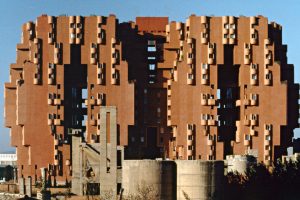Resumo
This thesis analyses the changes in architectural discourse, housing policies, and urban development before and after the neoliberal turn in France in the 1970s. Its topic is the relationship between housing and centrality in the urban periphery, and the key question is how this relationship changed in the course of the structural reforms of the 1970s following the economic crisis in France. The objects of this dissertation are six urban development projects designed by the Catalan architecture firm Ricardo Bofill–Taller de Arquitectura for the Parisian new towns and in the urban peripheries of Francoist Spain. The colossal housing project “The Spaces of Abraxas” in the Parisian new town Marne-la-Vallée, completed in 1983 during the heydays of postmodernism, serves as the starting point of the analysis. Subsequently, this study investigates Abraxas’ unrealized predecessors from the late 1960s and early 1970s, multifunctional housing monuments conceived to transpose the qualities of historic city centers into the peripheries of Madrid, Barcelona and Paris. I trace the relational change of housing and centrality from two angles: first, I draw on my ethnographic research based on living on site in Abraxas; second, I contextualize Abraxas within the economic, esthetic and urban aspects of its planning history and its unrealized forerunners. By adopting this transdisciplinary approach, this work closes three gaps in architectural historiography. First, it provides a new reading of postmodernism through the analysis of the largely unknown transdisciplinary approach of Ricardo Bofill-Taller de Arquitectura, an approach which is closer related to Alexandre Kojève’s interpretation of Hegel than to postmodernist language games. Second, the work foregrounds the French projects of Taller de Arquitectura which have neither been historically reviewed, nor embedded in the urban political context of the new town planning in Paris. Their analysis and contextualization opens up a new perspective on the claim of “urban innovation” in the implementation of the Parisian new towns before and during the cultural, economic and political upheavals of the 1970s. Third, my analysis of the neoliberal structural reforms of the 1970s and their effects on architecture, housing and urban space, through the case study of their socio-spatial consequences on Abraxas, shows ways to think of the architecture of housing as a process: as a process that emerges through political negotiation and continues to evolve in this way.
Ver tesis




